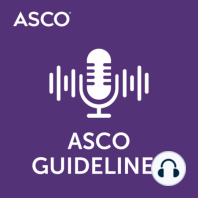7 min listen
Musculoskeletal Toxicities: Management of irAEs Guideline (Part 7)
FromASCO Guidelines
ratings:
Length:
10 minutes
Released:
Nov 8, 2021
Format:
Podcast episode
Description
An interview with Dr. Maria Suarez-Almazor from MD Anderson Cancer Center, author on “Management of Immune-Related Adverse Events in Patients Treated With Immune Checkpoint Inhibitor Therapy: ASCO Guideline Update.” She reviews identification, evaluation & management of musculoskeletal toxicities in patients receiving ICPis, including inflammatory arthritis, myositis & polymyalgia-like syndrome in Part 7 of this 13-part series. For more information visit www.asco.org/supportive-care-guidelines TRANSCRIPT [MUSIC PLAYING] SPEAKER: The purpose of this podcast is to educate and to inform. This is not a substitute for professional medical care, and is not intended for use in the diagnosis or treatment of individual conditions. Guests on this podcast express their own opinions, experience, and conclusions. The mention of any product, service, organization, activity, or therapy should not be construed as an ASCO endorsement. BRITTANY HARVEY: Hello and welcome to the ASCO Guidelines podcast series brought to you by the ASCO Podcast Network, a collection of nine programs covering a range of educational and scientific content and offering enriching insight into the world of cancer care. You can find all the shows, including this one, at ASCO.org/podcasts. My name is Brittany Harvey, and today, we're continuing our series on the management of immune-related adverse events. I am joined by Dr. Maria Suarez-Almazor from the University of Texas M.D. Anderson Cancer Center in Houston, Texas, author on Management of Immune-Related Adverse Events in Patients Treated With Immune Checkpoint Inhibitor Therapy: ASCO Guideline Update and Management of Immune-Related Adverse Events in Patients Treated with Chimeric Antigen Receptor T-Cell Therapy: ASCO Guideline. And today, we're focusing on musculoskeletal toxicities in patients treated with immune checkpoint inhibitor therapy. Thank you for being here, Dr. Suarez-Almazor. MARIA SUAREZ-ALMAZOR: Thank you. BRITTANY HARVEY: First I'd like to note that ASCO takes great care in the development of its guidelines and ensuring that the ASCO conflict of interest policy is followed for each guideline. The full conflict of interest information for the guideline panel is available online with the publication of the guidelines in the Journal of Clinical Oncology. Dr. Suarez-Almazor, do you have any relevant disclosures that are directly related to these guidelines? MARIA SUAREZ-ALMAZOR: Thank you, Brittany. I don't have any disclosures directly related to the guidelines. BRITTANY HARVEY: Thanks very much. Then getting into the content of this, what are the immune-related musculoskeletal toxicities addressed in this guideline? MARIA SUAREZ-ALMAZOR: There are three major musculoskeletal syndromes covered in this guideline-- inflammatory arthritis, myositis, and polymyalgia rheumatica. BRITTANY HARVEY: Great. Then let's start with that first one that you mentioned. So what are the key recommendations for identification, evaluation, and management of inflammatory arthritis? MARIA SUAREZ-ALMAZOR: The diagnosis of inflammatory arthritis is primarily based on a thorough joint exam to detect the presence of synovitis and how many joints and what joints are actually involved. For this reason, we recommend early referral to a rheumatologist. From a diagnostic perspective, we recommend testing for antinuclear antibodies or ANA, rheumatoid factor, and cyclic citrullinated peptide antibodies or anti-CCP. These are only positive in 10% to 20% of patients but may be indicative of a more persistent disease. As inflammatory arthritis does not have any specific biochemical parameters for follow up, we use inflammatory markers such as sed rate and CRP in conjunction with the clinical exam as indicators of disease activity. For grades 1 and 2, we recommend treatment with nonsteroidal anti-inflammatory drugs or NSAIDs, or low-dose steroids up to 20 milligrams of oral prednisone or equivalent. If there is involvement of only one o
Released:
Nov 8, 2021
Format:
Podcast episode
Titles in the series (100)
Human Papillomavirus Testing in Head and Neck Carcinomas Endorsement Guideline: An interview with Dr. Carole Fakhry from Johns Hopkins School of Medicine on the ASCO endorsement of the CAP guideline on human papillomavirus (HPV) testing in head and neck carcinomas. Read the full guideline at The purpose of this podcast is to... by ASCO Guidelines
